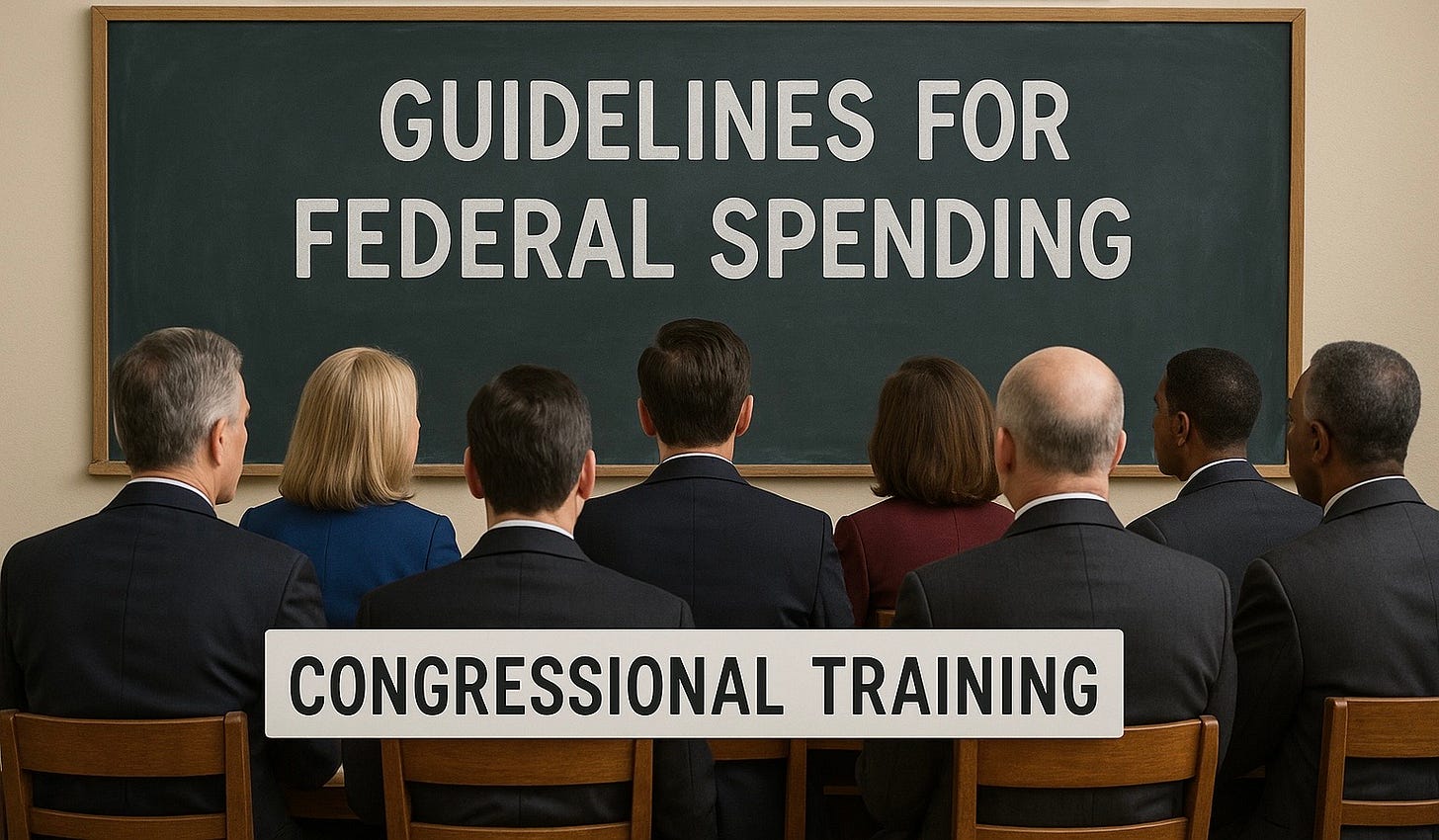A Three-Point Test for Responsible Federal Spending
If Members of Congress would strictly adhere to these principles, our republic would be all the better for it.
As Americans, we entrust our elected officials—our Senators, Representatives, and President—to seriously exercise the responsibility of managing our country's resources. Every dollar that the federal government spends must be scrutinized to ensure that it serves the public interest without exceeding constitutional bounds or burdening future generations unjustly. To that end, I propose a three-point test for approving federal spending: Is it constitutional? Does it make sense? And is it worth borrowing for? This straightforward framework can help our leaders make fiscally responsible decisions that uphold our founding principles and secure our economic future.
Point One: Is the Spending Constitutional?
The Constitution is the bedrock of our republic, which sets forth the restricted role of the federal government. Article I, Section 8 lists Congress's enumerated powers, which include regulating commerce, providing for the common defense, and managing the post office. Aside from these enumerations of specified powers, the Tenth Amendment adds: "The powers not delegated to the United States by the Constitution, nor prohibited by it to the States, are reserved to the States respectively, or to the people." The Ninth Amendment repeats that the enumeration of specified rights does not infer the absence of others retained by the people. Together, these amendments underscore a fundamental principle: that if something is not expressly delegated to the federal government, it is left to the states, local government, or private citizens.
While legislators are poised to sanction any expenditure, they must ask whether the unexpressed cost is within the federal government's delegated powers. For example, funding national defense or interstate transportation is delegated. However, initiatives like federal overreach into education or medicine often lack such a foundation, encroaching upon areas traditionally left to states or citizens. If the Constitution doesn't specify it, the federal government shouldn't fund it—period. That ensures we maintain the separation of powers our Founders created to safeguard liberty and prevent the national government from assuming too significant a role.
Point Two: Does the Spending Make Sense?
Even where spending is constitutional, it must be reasonable and practical. Take national defense, a flagship federal mission in Article I, Section 8. Nobody questions the need to defend the country with a strong military, but wasteful spending—i.e., excessive contracts, redundant programs, or outdated equipment—compromises the mission. Every dollar of expenditure must serve a clear, understandable purpose. For example, investing in advanced cybersecurity to protect against significant infrastructure threats is sensible in the current digital era. Spending on untested technologies or excessive bureaucratic overhead, however, is not.
This prong must be strictly examined: Does spending satisfy a real need? Do you know if spending is effective? Do you know if substitutes are available? Legislators must demand fact-based answers rather than indiscriminately passing budgets by relying on inertia, political necessity, or appeasing a well-connected lobbyist. By prioritizing prudent spending, we trust that taxpayer dollars are spent wisely within the federal government's proper domain of influence. I would also determine whether it is a redistribution of wealth, where the government decides who the winners and losers are with tax money. That's a perilous path that leads to increased government power.
Point Three: Is It Worth Borrowing For?
Even assuming that spending is constitutional and reasonable, there is one last gut check: Is it worth borrowing for? Our national debt currently stands at nearly $37 trillion, with annual deficits projected to exceed $2 trillion over the next decade, according to the Congressional Budget Office. Every dollar we borrow today becomes debt for future generations to repay, with interest, at market rates. In 2024 alone, over $1 trillion was spent servicing the debt—more than we spent on defense or Medicare. That is unsustainable.
Before they sign off on new expenses, leaders need to ask themselves: Is this program so vital that it is worth taking money that our children and grandchildren will have to repay? Emergency disaster aid or spending on infrastructure with long-term economic dividends may pass this test. Financing pet projects, redundant agencies, or programs of questionable utility won’t. If we do not anticipate our children borrowing money to pay for it, then neither should we expect future taxpaying citizens to do so.
A Call to Action
Our nation is facing a debt crisis that threatens our economic well-being and the future of our children. It is not the job of the federal government to solve every problem but to carry out its constitutional duties responsibly. It is this three-point test that we should apply—Is it constitutional? Does it make sense? Worth borrowing for? —lawmakers can bring fiscal extravagance under control. It's not budget balancing; it's honoring the Constitution, respecting taxpayers, and preserving the American Dream for our children. Let's insist on responsibility and make every dollar count towards our values and priorities.




Thank you Jon for bringing such common sense thinking to the forefront. Nearly every member of Congress has NOT done their job for a very long time.
It is imperative that we elect people who have a history which demonstrates their understanding and implementation of operating within a budget. Citizen leaders who have also demonstrated a commitment of service to the community and are incorruptible.
I am such a candidate for Congress. MaxsentiForCongress.com